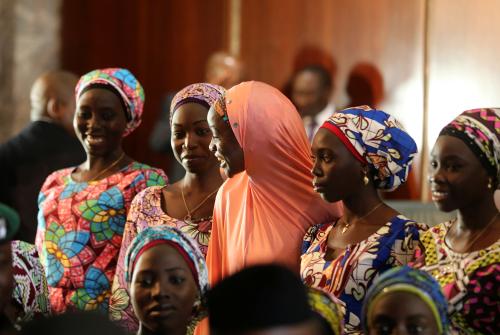The United Nations will be holding its high-level counterterrorism conference at U.N. headquarters in New York next month. It will be the first since Secretary-General António Guterres enacted much-heralded reforms of the U.N. counterterrorism architecture (which produced the U.N. Office of Counter-Terrorism and the appointment of an Under-Secretary-General for Counter-Terrorism). The June event will target heads of national counterterrorism agencies from around the world, with the stated objective of “strengthen[ing] multilateral counter-terrorism cooperation through new global, regional, and bilateral partnerships.”
So far, we know that national security officials from scores of capitals around the world will be in attendance—but civil society awaits their invitation. Instead, as it currently stands, those organizations will be relegated to the sidelines, having to organize and participate in “side-events” but kept out of the conference itself. This, despite the surplus of government-only or government-dominated counterterrorism conferences that have been organized by the U.N., Interpol, regional organizations, the Global Counterterrorism Forum, and the Defeat ISIS Coalition, as well as government-to-government partnerships that have been developed over the past 15 years.
The failure to include civil society organizations as core partners in this event is indicative of the broader reluctance of too many U.N. member states to view such groups as key stakeholders in countering terrorism and preventing violent extremism. This, despite the diverse and unique contributions that such organizations and other local actors continue to make on these issues within their communities, cities, and countries and the growing number of civil society organizations and other networks of local actors that have emerged in recent years to help address the violent extremism and terrorism challenges. Civil society organizations, through their actions, have earned the right to be viewed as allies and not adversaries in the fight against terrorism and violent extremism, and the United Nations should be doing more to recognize and champion that.
A conspicuous absence
One of the more significant developments in the field of counterterrorism and preventing violent extremism (PVE) has been the extent to which civil society actors have contributed to a range of important activities. They have developed and promoted peace education curricula in schools, for instance, helping to prevent the radicalization of teenagers in Pakistan, providing psycho-social interventions that teach marginalized youth in Jordan to manage their emotions related to feelings of injustice and hopelessness, creating a trust-building platform for members of government and law enforcement agencies, marginalized communities, and civil society to discuss issues related to radicalization in the religious sphere in Central Asia, working with county governments in Kenya to develop comprehensive local PVE action plans, creating “Mothers’ Schools” in more than a dozen countries to raise awareness among mothers of how to identify and best engage when they spot early signs of radicalization to violence among their children, and helping to reintegrate disillusioned former young members of Boko Haram and al-Shabaab.
According to one estimate there are more than 1,000 civil society-led PVE initiatives underway in more than 100 countries around the globe, and a growing number of civil society and other networks of local actors—women, youth, cities, families, mothers—working in this space. This evolution is based on a near-universal recognition that while national governments continue to bear the primary responsibility for their nation’s security, the threats from terrorism and violent extremism are more localized than ever. This requires constructive engagement with civil society actors that are often well-placed to identify, prevent, and address these threats. As highlighted in the (previous) U.N. secretary-general’s PVE Plan of Action, civil society involvement is crucial to all aspects of PVE.
Different parts of the U.N. system have recognized the increasingly important role that civil society plays in counterterrorism and PVE and have sought to engage with such groups in different contexts. However, this is often through the organizations’ ad hoc—perhaps even tokenistic—participation in one-off conferences, workshops, and other projects. For example, the well-meaning, high-level event on youth and violent extremism in New York earlier this spring—which the U.N. office of counterterrorism co-sponsored—featured passionate remarks from Secretary-General Guterres on the role young people can play in preventing violent extremism, but actually included few if any youth working to push back against the rising tide of violent extremism in fragile and conflicted affected settings.
A new approach
Rather than following the well-tread path of his predecessors and presiding over yet another large inter-governmental counterterrorism gathering next month—one that involves senior government officials delivering prepared statements about terrorist and violent extremist threats that require a “whole of society” response (but with virtually no non-governmental stakeholders present)—the Secretary-General should signal a new direction.
Building on the momentum generated by the architectural reforms he set in motion, Guterres should ensure the participants and speakers in the first high-level U.N. counterterrorism conference during his tenure reflect the diversity of nongovernmental stakeholders essential to effectively countering the spread of violent extremism. This would be consistent with the priority he has placed on prevention, including through his signature Sustaining Peace Agenda. He should use the occasion to launch a more systematic and strategic approach to engagement between the U.N. and civil society in this area. This approach should be informed by the structured U.N.-civil society engagement in different fields across its peace and security, development, and human rights agendas and include four inter-related elements:
- First, a commitment that senior U.N. counterterrorism and PVE officials will meet with independent civil society and other local actors during each country visit to raise local organizations’ and community actors’ awareness of the relevant U.N. frameworks and the U.N.’s role in supporting their implementation.
- Second, a commitment that the U.N. will seek civil society input in the development, implementation, and evaluation of U.N.-sponsored counterterrorism and PVE projects. This should include systematic consultation with women- and youth-led organizations to learn what initiatives are most needed and most likely to have impact. While the modalities for this still need to be developed, it will signal the commitment to transparency and inclusivity that has so far eluded the U.N.’s work in this area.
Third, a commitment that relevant senior U.N. officials will encourage all countries to include civil society and other local actors in developing PVE strategies, plans, policies, and particularly locally-focused programs. These must include the issues and the solutions that different sectors identify, underpinned with a commitment to increase U.N. funding for civil society organizations to co-design and deliver projects; U.N. funding could also be directed to the Global Community Engagement and Resilience Fund, the world’s only multilateral public-private funding mechanism dedicating to supporting grassroots PVE efforts that currently receives contributions from more than a dozen countries plus the EU, but would benefit considerably from U.N. funding and political support.
And finally, the establishment of a U.N. mechanism for strategic and sustained engagement with civil society around the counterterrorism and PVE agendas. This might include one or more of the following, drawing on good practices for U.N. engagement with civil society in other fields:
- Create a civil society unit within the U.N. Office of Counterterrorism, which would be dedicated to strengthening engagement between civil society, that office, and the wider 36-member U.N. Counter-Terrorism Implementation Task Force, which could be modeled on the approach taken by the Office of High Commissioner of Human Rights or U.N. Office on Drugs and Crime;
- Form a civil society advisory group to serve as fora for dialogue and sustained engagement between the U.N. and civil society organizations around the relevant agendas (this could be modeled on the approach taken by U.N. Women or the U.N. Development Programme); and/or
- Actively participate in relevant, existing civil society coordination and knowledge-sharing networks within or outside the U.N. system (e.g., RESOLVE, Horn of Africa P/CVE Civil Society Hub, Women’s Alliance for Security Leadership, the West Africa Network for Peacebuilding, Alliance for Peacebuilding, the Global Partnership for the Prevention of Armed Conflict, and the Western Balkans CSO P/CVE Hub), including for the purpose of helping find additional opportunities for civil society to engage the U.N. system on counterterrorism and PVE issues.
Carrying forward the above ideas would help address one of the limitations in the U.N.’s counterterrorism (and, more recently, PVE) work over the past 15 years: an overly insular approach that has focused a disproportionate of its attention on diplomats in New York, Geneva, and Vienna—or national security officials and practitioners in far-flung capitals—that too often ignore the grassroots actors. These actors have proven time and again to be the first line of defense when violent extremism rears its ugly head in communities around the globe and the time has come for the United Nations to come to their defense.










Commentary
Where is civil society in the U.N.’s counterterrorism efforts?
May 15, 2018